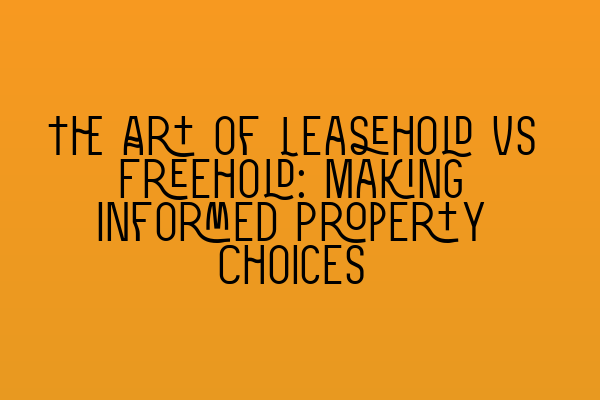The Art of Leasehold vs Freehold: Making Informed Property Choices
When it comes to investing in property, one of the fundamental decisions you’ll need to make is whether to opt for a leasehold or freehold property. Each option has its own set of advantages and considerations, making it crucial for potential buyers to understand the differences and make an informed decision. In this article, we will explore the key aspects of leasehold and freehold properties, helping you navigate through the complexities of property law.
Leasehold
A leasehold property is owned by a leaseholder who holds a lease agreement with the freeholder, also known as the landlord. The lease typically lasts for a specific period, typically 99 to 125 years, and the leaseholder has the right to occupy the property for that duration. However, the freeholder retains ultimate ownership of the land and the building.
Leasehold properties are common in apartments, flats, and some houses in the UK. While there are numerous advantages to owning a leasehold property, it’s crucial to understand the potential drawbacks as well:
- Advantages of Leasehold: Leasehold properties often have a lower purchase price compared to freehold properties, making them more affordable for first-time buyers. Additionally, maintenance and repair responsibilities usually fall on the freeholder, reducing the burden on leaseholders.
- Considerations: Leaseholders typically pay ground rent, service charges, and other fees to the freeholder. It’s essential to review the lease agreement thoroughly, as it may contain certain restrictions or covenants that could impact your enjoyment of the property.
If you’re considering purchasing a leasehold property, it’s crucial to seek professional advice from property law solicitors. They can help you understand the terms of the lease, highlight any potential issues, and ensure that your rights as a leaseholder are protected.
Freehold
A freehold property, on the other hand, gives the owner complete ownership of both the land and the building. Unlike leasehold, there is no time limit on ownership, providing the owner with maximum control and flexibility. Freehold properties are predominantly houses, although some flats and apartments can also be freehold.
Here are the key aspects to consider when opting for a freehold property:
- Advantages of Freehold: Owning a freehold property means you have total control over your property. There are no ground rent or service charges to pay, and you are not subject to restrictions imposed by a lease agreement. You can make changes or alterations to the property without seeking permission from a freeholder.
- Considerations: Freehold properties generally come with a higher price tag compared to leasehold properties. As the sole owner, you are responsible for all maintenance and repairs, and this can be an additional financial burden. Additionally, if the property is part of an estate, you may have to abide by certain estate rules.
Considering the long-term implications of owning a freehold property, it’s crucial to thoroughly assess your financial situation and responsibilities. Consulting with property law solicitors can provide you with valuable insights into potential legal issues and ensure that you make an informed decision.
Making the Right Choice
Ultimately, the decision between leasehold and freehold will depend on your needs, preferences, and financial circumstances. To make an informed choice, it’s important to consider factors such as budget, long-term plans, and the specific terms of leasehold agreements. Seeking professional advice from property law solicitors can help you navigate the complexities and ensure that you fully understand your rights and obligations.
SQE Property Law & Land Law can assist you with expert advice on leasehold and freehold matters. Our team of solicitors specializes in property law and can guide you through the process, ensuring that you make the best decision for your unique circumstances.
For more information on the SQE exams and how to prepare, please check out our related articles:
- SQE 1 Practice Exam Questions
- SQE 1 Practice Mocks FLK1 FLK2
- SQE 2 Preparation Courses
- SQE 1 Preparation Courses
- SRA SQE Exam Dates
Investing in property is a significant decision, and understanding the nuances of leasehold and freehold properties is crucial in making informed choices. With the right guidance and professional support, you can navigate the complexities of property law and embark on a successful property ownership journey.
